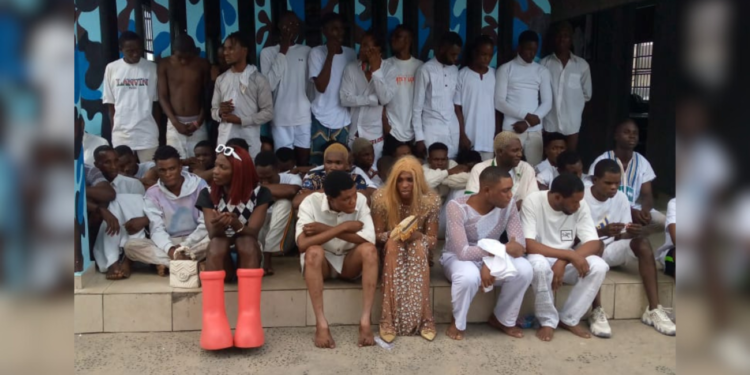By Martin Cole-
In a significant crackdown on what the Nigerian authorities deem as an affront to cultural norms in the country and legal regulations, police apprehended a total of 67 individuals participating in a gay wedding celebration in Ekpan town, located in the southern Delta state.
The arrests, conducted in the early hours of the morning on Monday, have triggered discussions regarding the intersection of traditional values, religious beliefs, legal statutes, and the contrasting perspectives of Western societies on homosexuality.
The operation, orchestrated by the Nigerian police, unfolded at a hotel venue where the so-called “gay wedding” was taking place. According to Bright Edafe, the state police spokesman, initial reports indicated that around 200 people were apprehended during the raid.
He told a press conference that homosexuality will never be tolerated in Nigeria.
He said: “The amazing part of it was that we saw two suspects, and there is a video recording where they were performing their wedding ceremony,” he said.
“We are in Africa and we are in Nigeria. We cannot copy the Western world because we don’t have the same culture.”
He reiterated that police officers in Nigeria “cannot fold their hands” and watch gay people openly express their orientation in the country.
“This is not something that will be allowed in Nigeria,” he said, adding that the suspects will be charged in court at the end of the investigation
Following preliminary investigations, this number was narrowed down to 67 individuals who were subsequently taken into custody. The detained individuals were presented to the media at a local police station.
The nature of the event that prompted these arrests highlights the complexities at play. As Edafe emphasized, video evidence depicted two individuals engaged in a wedding ceremony. In a nation where cultural and religious practices shape societal norms, this expression of same-sex affection was deemed incompatible with prevailing beliefs.
Homosexuality, a topic that has ignited impassioned discussions worldwide, assumes a distinct character in Nigeria. The nation’s laws explicitly criminalize same-sex relationships, with a particular focus on gay marriage, which carries the potential for a 14-year prison sentence.
The legal stance, enacted in 2014 under the administration of former President Goodluck Jonathan, drew the ire of international observers and rights advocates, sparking debates on human rights, personal freedoms, and cultural autonomy.
The international community has always condemned the legal stance of several African countries in prosecuting homosexuality, and has in the past heaped pressure for reform in those countries when it comes to their strict stance on same sex marriage and activities. The pressure has yielded no results.
Amnesty International’s Nigeria office condemned the arrests and called for “an immediate end to this witch-hunt.”
The contrasting dynamics at play are underpinned by deep-rooted cultural and religious influences. Nigeria, like many other countries in Africa, stands at the crossroads of tradition and modernity.
Cultural values that have been established over generations are in tune with deeply held religious beliefs to form a moral fabric that often vehemently opposes homosexuality. In many African societies, homosexuality is seen as antithetical to these values and beliefs, thereby triggering swift and decisive responses from both the public and the authorities.
While international norms increasingly embrace LGBTQ+ rights and recognition, the situation in Nigeria is emblematic of the stark divergence between Western perspectives and those of many African nations. More than 30 African countries currently criminalize same-sex relationships, and Nigeria remains one of the nations where arrests of individuals on the basis of their sexual orientation are far from uncommon.
The recent arrests in Delta state underscore the resolve of Nigerian authorities to uphold the nation’s cultural and moral ethos. Edafe’s statement captures this sentiment, asserting that Nigeria’s cultural distinctiveness demands a departure from Western models of acceptance. He emphasized, “We are in Africa and we are in Nigeria. We cannot copy the Western world because we don’t have the same culture.”
The question of cultural relativism versus universal human rights is never more pronounced than in discussions surrounding LGBTQ+ rights. As nations grapple with these multifaceted debates, the Nigerian case serves as a microcosm of these complex conversations.
Edafe’s assertion that “this is not something that will be allowed in Nigeria” resonates with the prevailing legal and societal attitudes. The arrested individuals now face legal consequences, with Edafe confirming that they will be charged in court after the completion of the ongoing investigation.
The incident has prompted intense debates on both national and international platforms. While proponents of LGBTQ+ rights decry the arrests as a violation of personal freedoms and human rights, those advocating for cultural preservation and adherence to traditional values insist that such actions are imperative for safeguarding the nation’s identity and moral fiber.
In an era of rapid globalization, the clash of cultures and values remains a deeply relevant issue. As nations like Nigeria navigate this complex landscape, they continue to grapple with questions of autonomy, identity, and the boundaries of human rights within the context of their unique cultural tapestry.




